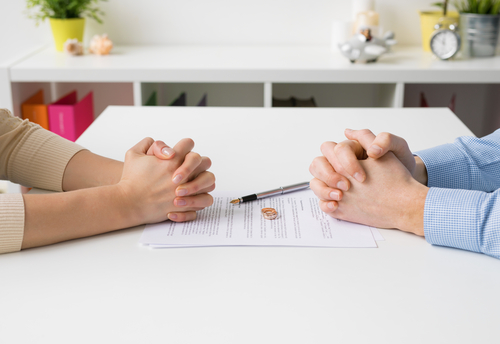Getting over heartbreak and moving on could be described as a skill most of us acquire through life. In modern society, people can have multiple partners and relationships during their lifetime, allowing them to understand what it feels like when a relationship fails. We learn what it feels like to be hurt, but also how guilty we feel when we hurt someone we love. And we also know the aftermath. It hurts a lot for a while, and then it gets better.
When it comes to divorce, especially when children are involved, the stakes are higher. But many of us can still rely on what we learned from previous failed relationships. Some people may have a harder time than others and might need professional guidance on how to heal from a divorce, particularly if it caused lasting depression or low self-esteem. But most people agree that divorce is hard and that getting through it and coping with your feelings requires significant effort and perseverance.
What Are The Stages Of Divorce?
Not all marriages are the same; each person will experience divorce in their own way and deal with it differently, but there are some general, objective phases most people go through. You might not experience all of these stages, or not in this exact order, but to get a general overview of what to expect, these are the commonly encountered stages pre and post divorce:
- Disillusionment in your marriage, your partner, and the relationship you have can last for years before you even think of divorce.
- Denial. People usually assume that they’re going through a rough patch and expect things to get better.
- Resentment and dissatisfaction after the realization that your relationship is not improving, and the “rough patch” has turned into a new normal. This could lead to fights and blaming one another, or a quiet depression.
- Anger or fear. One or both partners may start to feel persistent anger towards the other or fear that there’s no hope for their marriage.
- Deciding to divorce and initializing the process, after the anger subsides. Partners finally accept the fact that the marriage can’t be saved and start looking into the technicalities of the divorce process.
- The guilt stage may or may not happen to everyone. People who blame themselves for the failure of their marriage usually experience guilt due to certain decisions they made or failed to act in crucial moments. And, sometimes the guilt they feel towards themselves for staying too long and the personal pain that comes with self-disrespect.
- Acceptance is the phase when people come to terms with the fact that the relationship with their spouse was deeply flawed and unhealthy, and begin opening up to the option of getting another chance to feel happy and fulfilled.
- A new beginning is the final stage you’ve been trying to reach all along. Achieving it could take a while, sometimes even years, but as new people and experiences start bringing joy to your life you will learn to let go of negative feelings and resentment from the past that were holding you back. You may finally be able to forgive both your partner and yourself for all the pain you went through.

Why Am I Struggling To Overcome Divorce?
You’ll probably feel a lot of mixed emotions when you get divorced. The chances are you’ve been feeling them for a long time while you were contemplating the divorce, after realizing that your marriage was not what you had hoped for. It is normal to feel hurt, confused, depressed, or angry; even if you’re the one who chose to ask for a divorce.
Keep in mind that experiencing all these feelings, even the contradictory ones, is perfectly normal. Resentment, guilt, numbness, insecurity, and even the desire for revenge; are all natural feelings when it comes to divorce.
You are not alone when it comes to those feelings and, some of the reasons you experience them are quite logical:
- You’re losing a person you love. Divorce is not a switch that can just turn that love off unless you already stopped loving your partner long before the marriage ended. You might regret your decision, and moving on might seem impossible at times.
- Divorce leads to breaking up your family, and not just your immediate one. You may break ties with your spouse’s side of the family which has become a huge part of your life. People who invest a lot of time and effort into their family life and try to provide their kids with a happy childhood might feel like they failed and damaged them for the rest of their lives.
- It’s hard to look forward as you mourn all the unrealized potential and plans that involve your spouse and children. It’s natural to feel like the divorce has taken away all the dreams for the future you shared with your spouse.
- You may also feel shame if you’re the one that ended the relationship. Many people beat themselves up for not being able to save their marriage. This can damage their sense of self-worth and make them feel unlovable.
- Divorce won’t suddenly make you happy even if you’re the one who pushed for it. The feeling of loss will linger for a while.
- Some of your mutual friends might isolate you and take your spouse’s side.
- You may have trouble trusting people again and lose confidence in both yourself and others.
How Can I Finally Overcome Divorce?
It may seem like the feelings you’re experiencing after divorce will last forever. Many people even compare them to the death of someone you love. Don’t forget that it’s perfectly normal to feel sad, depressed, or even terrified of the future. But eventually, you will move on. “When will I get over my divorce” is a question that could constantly be on your mind and the answer might sound like a cliché, but there’s a good reason behind it: give yourself time. Everybody heals at their own pace. If it takes you longer than you expected, don’t let it get you down.
Some of the things you might do to speed up the process include:
- Seeing a professional if you feel like you need to explore your feelings and actions that lead to the divorce. This may give you closure so you can finally move on.
- Don’t be afraid of self-reflection, even if it leads you to expose some uncomfortable truths about yourself. It will ultimately help you.
- Don’t let your pain influence your children’s well-being. You’ll be a much better example to your children as a strong, happy and dignified parent, than a married but unhappy one.
- Don’t allow yourself to get stuck in the past. Maybe your old plans and hopes for the future fell through, but you can make new ones, more suitable to your current needs and desires.
- Accept that we all make mistakes and that you probably made some either by initially choosing your partner or mistakes you made during the marriage. Don’t let this destroy your self-esteem, and make you feel worthless or unworthy of love.
- Spend time with your friends. Think about the friendships that make you feel good and turn to them for support. Even though you may have trust issues, try to make some new friends too.

How to heal from divorce and learn to find intimacy in new relationships
To learn to love yourself again make your needs a top priority with the help of experienced PIVOT coaches. They can guide you to remember what your hopes and dreams were before your marriage, and examine if they’ve been pushed aside. This may finally be the right time to work on making them happen. Another safe way that can help you explore your feelings and options is by attending one of our Glass House retreats. Take the time to try new things and uncover new ways of thinking. Focusing on self-care can help you recover from a failed marriage. You can learn to trust people again and avoid potential intimacy problems in relationships when you feel ready to try again
















